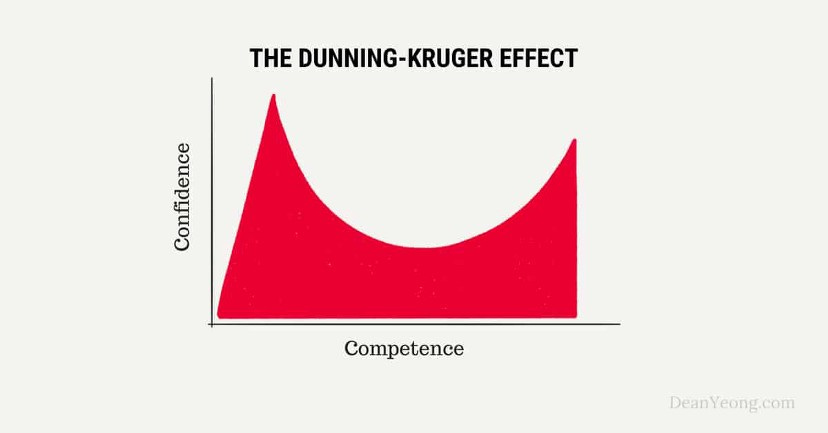“The loudest person in the room is the weakest”
- Frank Lucas
Have you encountered a situation where you argued with someone over a topic he/she knew nothing about and claimed they knew a lot about.
I want to tell you that you might be that person.
Why does it happen?
Dunning-Kruger Effect occurs when people lacking knowledge and expertise in specific fields tend to overestimate themselves and believe that they’re competent and might affirm “ Professionality”.
In fact, as humans, We don’t acknowledge our incompetence until we get corrected, but we still have an ego that prevents us from asking for feedback hence, We always seek approval, not an improvement, thus, we’re missing a huge chance to use evaluation and criticism to enhance our skills and be able to estimate ourselves accurately.
Effects:
Overestimating oneself abilities would trick us into false confidence, and this type of confidence can cause people to truly believe that they’re qualified enough.
Confidence is a highly prized reward that many people would rather pretend to be smart or skilled than risk looking inadequate and losing face, to elaborate, People trust the certainty and confidence of someone who knows less than one with higher knowledge and less confidence.1
Initialy, people with basic Knowledge have high “Confidence”. Over time they get exposed to their real skills and their confidence dives down , through learning and time their confidence increases gradually.
Illustration by - DeanYeoung.com
How to estimate ourselves precisely
There are simple steps to be taken to avoid falling short to your fake beliefs:
Learn how to take feedback and critiques into consideration, evaluation plays a key role in allowing us to perceive our limitations and how we can expand the boundaries of our skills.
Before you talk about a particular topic, ask yourself: Do I know enough about this? this allows you to think thoroughly and you’ll be able to accurately predict how much you’re actually qualified.
Lastly, Think about it as a double-edged sword. It’s true that we’re going to get credit for our fake knowledge, and confidence, and might get a promotion at work, but at the same time, we’re throwing a fake image of ourselves. It’s up to you to decide which person you want to become “Truthful” or “‘Deceitful”.
Adi Jaffe, PhD.
All About Addiction January 7, 2020
(https://www.psychologytoday.com/sg/blog/all-about-addiction/202001/ignorance-isnt-always-bliss-the-dunning-kruger-effect)




